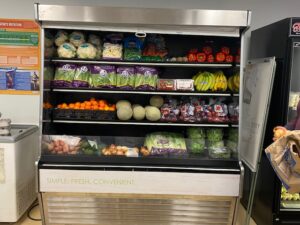
Social determinants of health, such as access to healthy foods, play an important role in disease prevention, health status and health outcomes. Food insecurity is known to impact health status, including putting individuals at greater risk for chronic diseases such as diabetes, hypertension, and kidney disease. Food insecure individuals with a diet-sensitive chronic disease experience more difficulties managing their health, leading to more health complications, emergency room usage, hospital stays, and readmissions, and ultimately higher health care costs. Food insecure patients have an average of $1,863 in extra health care expenditures per year.
In an effort to reduce food insecurity and increase overall health, the Food Bank partners with health care agencies to develop onsite pantries that distribute tailored groceries to support patients’ chronic diseases. This food is distributed in conjunction with food access resources, nutrition education, and counseling opportunities.
With the expansion of FAM programs, the Food Bank is enthusiastic about exploring additional program models that serve our community’s needs.
For more information, or to get involved in this program, contact:
Samantha Monks, MS, RDN
Food As Medicine Manager
Food As Medicine Manager
518-786-3691 x298
FoodAsMedicine@regionalfoodbank.net
FoodAsMedicine@regionalfoodbank.net





